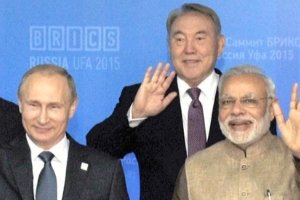Russia's Syria initiative and the exaggerated ISIS threat to Central Asia
By Emil Aslan Souleimanov
September 25th, 2015, The CACI Analyst
Russia’s recent military engagement in Syria and calls for the establishment of an international coalition against the terrorist group calling itself the Islamic State (ISIS) has produced renewed interest in Moscow’s policies toward the jihadist quasi-state. Against this background, while many have speculated about Moscow’s true intentions in the Middle East, relatively little attention has been paid to Moscow’s interests in Central Asia and the Caucasus in the context of its increasingly vocal rhetoric of fighting ISIS. Moscow is actively utilizing the risks and threats stemming from the ISIS to boost its clout in the near and far abroad.
Was the SCO summit in Ufa a breakthrough?
By Stephen Blank (19/08/2015 issue of the CACI Analyst)
The annual summit of the Shanghai Cooperation Organization took place on July 9-10 in Ufa, and ratified the expansion of membership to include India and Pakistan, and Iran may join in the future. Thus the SCO is well on the way to becoming a venue for the most powerful Inner Asian states to work together and discuss policy issues affecting Central Asia and beyond. But new membership is not likely to make this organization any more effective as a regional security provider. In fact, all the disputes among the major members, including India and Pakistan, might be imported into the SCO’s structure and serve as a brake on the expansion of its capabilities.

Iran and the SCO: new opportunities, new challenges
By Richard Weitz (05/08/2015 issue of the CACI Analyst)
Now that the UN Security Council has blessed the Iranian nuclear deal, Tehran’s chances of becoming a full member of the Shanghai Cooperation Organization (SCO) in coming years have improved, following a decade of rejection. Iranian leaders have long wanted to join the SCO to gain diplomatic, economic, and security advantages. Nonetheless, Iran will need to overcome several major obstacles on its path to full membership, even if nothing goes amiss with the implementation of its nuclear deal.
Uzbekistan concerned over SCO expansion
By Farkhod Tolipov (05/08/2015 issue of the CACI Analyst)
The Shanghai Cooperation Organization (SCO) held its annual summit on June 9-10, 2015, in the Russian town of Ufa, which was an historical turning point in the organization’s evolution. It adopted a Development Strategy towards 2025 and admitted India and Pakistan as full members. Uzbekistan has taken over the Chairmanship of the SCO from Russia for the next one year period. During the summit, Uzbekistan’s President Islam Karimov expressed concerns revealing Tashkent’s reluctant acknowledgement of the fact that from now on the SCO will be more than just a Central Asia-focused structure.

CACI Analyst, July 8, 2015
Contents
Analytical Articles
THE UZBEK-TAJIK DÉTENTE: CAN IT LAST?, by George Voloshin
AGRI’S PROGRESS ADVANCES BRUSSELS’ AND BAKU’S ENERGY AGENDAS, by Micha’el Tanchum
ISLAMIC STATE IN CENTRAL ASIA: THREAT OR OPPORTUNITY, by Charlie Smith
IS THE NORTH CAUCASUS BECOMING ANOTHER BATTLEFIELD IN THE GLOBAL JIHAD?, by Tomáš Baranec
Field Reports
TAJIKISTAN’S GOVERNMENT MISSES THE REAL PROBLEM OF LABOR MIGRANTS, by Oleg Salimov
RULING COALITION TO CUT FUNCTION OF GEORGIA’S NATIONAL BANK, by Eka Janashia
KYRGYZSTAN’S CONSTITUTIONAL CHAMBER DISMISSES JUDGE, by Arslan Sabyrbekov
BAKU CRACKS DOWN ON ALTERNATIVE MEDIA AFTER CONCLUDING EUROPEAN GAMES, by Mina Muradova






